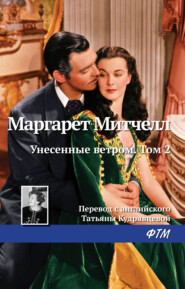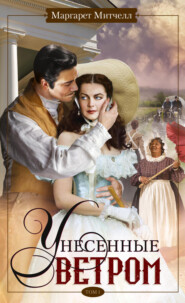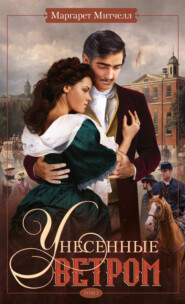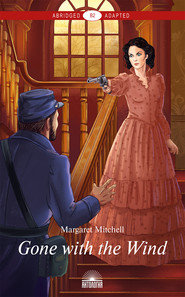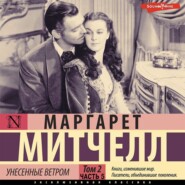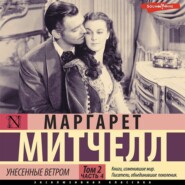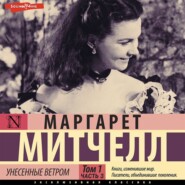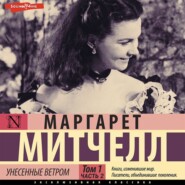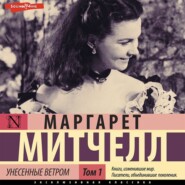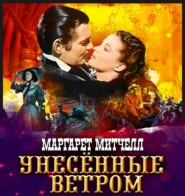По всем вопросам обращайтесь на: info@litportal.ru
(©) 2003-2024.
✖
Gone with the Wind. Volume 1 / Унесенные ветром. Том 1
Настройки чтения
Размер шрифта
Высота строк
Поля
She reached behind her and jerked the little girl forward. She was a brown little creature, with skinny legs like a bird and a myriad of pigtails carefully wrapped with twine sticking stiffly out from her head. She had sharp, knowing eyes that missed nothing and a studiedly stupid look on her face.
“Thank you, Dilcey,” Scarlett replied, “but I'm afraid Mammy will have something to say about that. She's been my maid ever since I was born.”
“Mammy getting ole,” said Dilcey, with a calmness that would have enraged Mammy. “She a good mammy, but you a young lady now and needs a good maid, and my Prissy been maidin' fo' Miss India fo' a year now. She kin sew and fix hair good as a grown pusson.”
Prodded by her mother, Prissy bobbed a sudden curtsy and grinned at Scarlett, who could not help grinning back.
“A sharp little wench,” she thought, and said aloud: “Thank you, Dilcey, we'll see about it when Mother comes home.”
“Thankee, Ma'm. I gives you a good night,” said Dilcey and, turning, left the room with her child, Pork dancing attendance. The supper things cleared away, Gerald resumed his oration, but with little satisfaction to himself and none at all to his audience. His thunderous predictions of immediate war and his rhetorical questions as to whether the South would stand for further insults from the Yankees only produced faintly bored, “Yes, Papas” and “No, Pas.” Carreen, sitting on a hassock under the big lamp, was deep in the romance of a girl who had taken the veil after her lover's death and, with silent tears of enjoyment oozing from her eyes, was pleasurably picturing herself in a white coif. Suellen, embroidering on what she gigglingly called her “hope chest,” was wondering if she could possibly detach Stuart Tarleton from her sister's side at the barbecue tomorrow and fascinate him with the sweet womanly qualities which she possessed and Scarlett did not. And Scarlett was in a tumult about Ashley.
How could Pa talk on and on about Fort Sumter and the Yankees when he knew her heart was breaking? As usual in the very young, she marveled that people could be so selfishly oblivious to her pain and the world rock along just the same, in spite of her heartbreak.
Her mind was as if a cyclone had gone through it, and it seemed strange that the dining room where they sat should be so placid, so unchanged from what it had always been. The heavy mahogany table and sideboards, the massive silver, the bright rag rugs on the shining floor were all in their accustomed places, just as if nothing had happened. It was a friendly and comfortable room and, ordinarily, Scarlett loved the quiet hours which the family spent there after supper; but tonight she hated the sight of it and, if she had not feared her father's loudly bawled questions, she would have slipped away, down the dark hall to Ellen's little office and cried out her sorrow on the old sofa.
That was the room that Scarlett liked the best in all the house. There, Ellen sat before her tall secretary each morning, keeping the accounts of the plantation and listening to the reports of Jonas Wilkerson, the overseer. There also the family idled while Ellen's quill scratched across her ledgers. Gerald in the old rocker, the girls on the sagging cushions of the sofa that was too battered and worn for the front of the house. Scarlett longed to be there now, alone with Ellen, so she could put her head in her mother's lap and cry in peace. Wouldn't Mother ever come home?
Then, wheels ground sharply on the graveled driveway, and the soft murmur of Ellen's voice dismissing the coachman floated into the room. The whole group looked up eagerly as she entered rapidly, her hoops swaying, her face tired and sad. There entered with her the faint fragrance of lemon verbena sachet, which seemed always to creep from the folds of her dresses, a fragrance that was always linked in Scarlett's mind with her mother. Mammy followed at a few paces, the leather bag in her hand, her underlip pushed out and her brow lowering. Mammy muttered darkly to herself as she waddled, taking care that her remarks were pitched too low to be understood but loud enough to register her unqualified disapproval.
“I am sorry I am so late,” said Ellen, slipping her plaid shawl from drooping shoulders and handing it to Scarlett, whose cheek she patted in passing.
Gerald's face had brightened as if by magic at her entrance.
“Is the brat baptized?” he questioned.
“Yes, and dead, poor thing,” said Ellen. “I feared Emmie would die too, but I think she will live.”
The girls' faces turned to her, startled and questioning, and Gerald wagged his head philosophically.
“Well, 'tis better so that the brat is dead, no doubt, poor fatherle-”
“It is late. We had better have prayers now,” interrupted Ellen so smoothly that, if Scarlett had not known her mother well, the interruption would have passed unnoticed.
It would be interesting to know who was the father of Emmie Slattery's baby, but Scarlett knew she would never learn the truth of the matter if she waited to hear it from her mother. Scarlett suspected Jonas Wilkerson, for she had frequently seen him walking down the road with Emmie at nightfall. Jonas was a Yankee and a bachelor, and the fact that he was an overseer forever barred him from any contact with the County social life. There was no family of any standing into which he could marry, no people with whom he could associate except the Slatterys and riffraff like them. As he was several cuts above the Slatterys in education, it was only natural that he should not want to marry Emmie, no matter how often he might walk with her in the twilight.
Scarlett sighed, for her curiosity was sharp. Things were always happening under her mother's eyes which she noticed no more than if they had not happened at all. Ellen ignored all things contrary to her ideas of propriety and tried to teach Scarlett to do the same, but with poor success.
Ellen had stepped to the mantel to take her rosary beads from the small inlaid casket in which they always reposed when Mammy spoke up with firmness.
“Miss Ellen, you gwine eat some supper befo' you does any prayin'.”
“Thank you. Mammy, but I am not hungry.”
“Ah gwine fix yo' supper mahseff an' you eats it,” said Mammy, her brow furrowed with indignation as she started down the hall for the kitchen. “Poke!” she called, “tell Cookie stir up de fiah. Miss Ellen home.”
As the boards shuddered under her weight, the soliloquy she had been muttering in the front hall grew louder and louder, coming clearly to the ears of the family in the dining room.
“Ah has said time an' again, it doan do no good doin' nuthin' fer w'ite trash. Dey is de shiflesses, mos' ungrateful passel of no-counts livin'. An' Miss Ellen got no bizness weahin' herseff out waitin' on folks dat did dey be wuth shootin' dey'd have niggers ter wait on dem. An' Ah has said-”
Her voice trailed off as she went down the long open passageway, covered only by a roof, that led into the kitchen. Mammy had her own method of letting her owners know exactly where she stood on all matters. She knew it was beneath the dignity of quality white folks to pay the slightest attention to what a darky said when she was just grumbling to herself. She knew that to uphold this dignity, they must ignore what she said, even if she stood in the next room and almost shouted. It protected her from reproof, and it left no doubt in anyone's mind as to her exact views on any subject.
Pork entered the room, bearing a plate, silver and a napkin. He was followed closely by Jack, a black little boy of ten, hastily buttoning a white linen jacket with one hand and bearing in the other a fly-swisher, made of thin strips of newspaper tied to a reed longer than he was. Ellen had a beautiful peacock-feather fly-brusher, but it was used only on very special occasions and then only after domestic struggle, due to the obstinate conviction of Pork, Cookie and Mammy that peacock feathers were bad luck.
Ellen sat down in the chair which Gerald pulled out for her and four voices attacked her.
“Mother, the lace is loose on my new ball dress and I want to wear it tomorrow night at Twelve Oaks. Won't you please fix it?”
“Mother, Scarlett's new dress is prettier than mine and I look like a fright in pink. Why can't she wear my pink and let me wear her green? She looks all right in pink.”
“Mother, can I stay up for the ball tomorrow night? I'm thirteen now-”
“Mrs. O'Hara, would you believe it- Hush, you girls, before I take me crop to you! Cade Calvert was in Atlanta this morning and he says-will you be quiet and let me be hearing me own voice? – and he says it's all upset they are there and talking nothing but war, militia drilling, troops forming. And he says the news from Charleston is that they will be putting up with no more Yankee insults.”
Ellen's tired mouth smiled into the tumult as she addressed herself first to her husband, as a wife should.
“If the nice people of Charleston feel that way, I'm sure we will all feel the same way soon,” she said, for she had a deeply rooted belief that, excepting only Savannah, most of the gentle blood of the whole continent could be found in that small seaport city, a belief shared largely by Charlestonians.
“No, Carreen, next year, dear. Then you can stay up for balls and wear grown-up dresses, and what a good time my little pink cheeks will have! Don't pout, dear. You can go to the barbecue, remember that, and stay up through supper, but no balls until you are fourteen.
“Give me your gown, Scarlett, I will whip the lace for you after prayers.
“Suellen, I do not like your tone, dear. Your pink gown is lovely and suitable to your complexion, Scarlett's is to hers. But you may wear my garnet necklace tomorrow night.”
Suellen, behind her mother's hack, wrinkled her nose triumphantly at Scarlett, who had been planning to beg the necklace for herself. Scarlett put out her tongue at her. Suellen was an annoying sister with her whining and selfishness, and had it not been for Ellen's restraining hand, Scarlett would frequently have boxed her ears.
“Now, Mr. O'Hara, tell me more about what Mr. Calvert said about Charleston,” said Ellen.
Scarlett knew her mother cared nothing at all about war and politics and thought them masculine matters about which no lady could intelligently concern herself. But it gave Gerald pleasure to air his views, and Ellen was unfailingly thoughtful of her husband's pleasure.
While Gerald launched forth on his news, Mammy set the plates before her mistress, golden-topped biscuits, breast of fried chicken and a yellow yam open and steaming, with melted butter dripping from it. Mammy pinched small Jack, and he hastened to his business of slowly swishing the paper ribbons back and forth behind Ellen. Mammy stood beside the table, watching every forkful that traveled from plate to mouth, as though she intended to force the food down Ellen's throat should she see signs of flagging. Ellen ate diligently, but Scarlett could see that she was too tired to know what she was eating. Only Mammy's implacable face forced her to it.
When the dish was empty and Gerald only midway in his remarks on the thievishness of Yankees who wanted to free darkies and yet offered no penny to pay for their freedom, Ellen rose.
“We'll be having prayers?” he questioned, reluctantly.
“Yes. It is so late-why, it is actually ten o'clock,” as the clock with coughing and tinny thumps marked the hour. “Carreen should have been asleep long ago. The lamp, please, Pork, and my prayer book, Mammy.”
Prompted by Mammy's hoarse whisper, Jack set his fly-brush in the corner and removed the dishes, while Mammy fumbled in the sideboard drawer for Ellen's worn prayer book. Pork, tiptoeing, reached the ring in the chain and drew the lamp slowly down until the table top was brightly bathed in light and the ceiling receded into shadows. Ellen arranged her skirts and sank to the floor on her knees, laying the open prayer book on the table before her and clasping her hands upon it. Gerald knelt beside her, and Scarlett and Suellen took their accustomed places on the opposite side of the table, folding their voluminous petticoats in pads under their knees, so they would ache less from contact with the hard floor. Carreen, who was small for her age, could not kneel comfortably at the table and so knelt facing a chair, her elbows on the seat. She liked this position, for she seldom failed to go to sleep during prayers and, in this postures it escaped her mother's notice.
The house servants shuffled and rustled in the hall to kneel by the doorway, Mammy groaning aloud as she sank down, Pork straight as a ramrod, Rosa and Teena, the maids, graceful in their spreading bright calicoes, Cookie gaunt and yellow beneath her snowy head rag, and Jack, stupid with sleep, as far away from Mammy's pinching fingers as possible. Their dark eyes gleamed expectantly, for praying with their white folks was one of the events of the day. The old and colorful phrases of the litany with its Oriental imagery meant little to them but it satisfied something in their hearts, and they always swayed when they chanted the responses: “Lord, have mercy on us,” “Christ, have mercy on us.”
Ellen closed her eyes and began praying, her voice rising and falling, lulling and soothing. Heads bowed in the circle of yellow light as Ellen thanked God for the health and happiness of her home, her family and her negroes.
When she had finished her prayers for those beneath the roof of Tara, her father, mother, sisters, three dead babies and “all the poor souls in Purgatory,” she clasped her white beads between long fingers and began the Rosary. Like the rushing of a soft wind, the responses from black throats and white throats rolled back:
“Holy Mary, Mother of God, pray for us sinners, now, and at the hour of our death.”
Despite her heartache and the pain of unshed tears, a deep sense of quiet and peace fell upon Scarlett as it always did at this hour. Some of the disappointment of the day and the dread of the morrow departed from her, leaving a feeling of hope. It was not the lifting up of her heart to God that brought this balm, for religion went no more than lip deep with her. It was the sight of her mother's serene face upturned to the throne of God and His saints and angels, praying for blessings on those whom she loved. When Ellen intervened with Heaven, Scarlett felt certain that Heaven heard.
“Thank you, Dilcey,” Scarlett replied, “but I'm afraid Mammy will have something to say about that. She's been my maid ever since I was born.”
“Mammy getting ole,” said Dilcey, with a calmness that would have enraged Mammy. “She a good mammy, but you a young lady now and needs a good maid, and my Prissy been maidin' fo' Miss India fo' a year now. She kin sew and fix hair good as a grown pusson.”
Prodded by her mother, Prissy bobbed a sudden curtsy and grinned at Scarlett, who could not help grinning back.
“A sharp little wench,” she thought, and said aloud: “Thank you, Dilcey, we'll see about it when Mother comes home.”
“Thankee, Ma'm. I gives you a good night,” said Dilcey and, turning, left the room with her child, Pork dancing attendance. The supper things cleared away, Gerald resumed his oration, but with little satisfaction to himself and none at all to his audience. His thunderous predictions of immediate war and his rhetorical questions as to whether the South would stand for further insults from the Yankees only produced faintly bored, “Yes, Papas” and “No, Pas.” Carreen, sitting on a hassock under the big lamp, was deep in the romance of a girl who had taken the veil after her lover's death and, with silent tears of enjoyment oozing from her eyes, was pleasurably picturing herself in a white coif. Suellen, embroidering on what she gigglingly called her “hope chest,” was wondering if she could possibly detach Stuart Tarleton from her sister's side at the barbecue tomorrow and fascinate him with the sweet womanly qualities which she possessed and Scarlett did not. And Scarlett was in a tumult about Ashley.
How could Pa talk on and on about Fort Sumter and the Yankees when he knew her heart was breaking? As usual in the very young, she marveled that people could be so selfishly oblivious to her pain and the world rock along just the same, in spite of her heartbreak.
Her mind was as if a cyclone had gone through it, and it seemed strange that the dining room where they sat should be so placid, so unchanged from what it had always been. The heavy mahogany table and sideboards, the massive silver, the bright rag rugs on the shining floor were all in their accustomed places, just as if nothing had happened. It was a friendly and comfortable room and, ordinarily, Scarlett loved the quiet hours which the family spent there after supper; but tonight she hated the sight of it and, if she had not feared her father's loudly bawled questions, she would have slipped away, down the dark hall to Ellen's little office and cried out her sorrow on the old sofa.
That was the room that Scarlett liked the best in all the house. There, Ellen sat before her tall secretary each morning, keeping the accounts of the plantation and listening to the reports of Jonas Wilkerson, the overseer. There also the family idled while Ellen's quill scratched across her ledgers. Gerald in the old rocker, the girls on the sagging cushions of the sofa that was too battered and worn for the front of the house. Scarlett longed to be there now, alone with Ellen, so she could put her head in her mother's lap and cry in peace. Wouldn't Mother ever come home?
Then, wheels ground sharply on the graveled driveway, and the soft murmur of Ellen's voice dismissing the coachman floated into the room. The whole group looked up eagerly as she entered rapidly, her hoops swaying, her face tired and sad. There entered with her the faint fragrance of lemon verbena sachet, which seemed always to creep from the folds of her dresses, a fragrance that was always linked in Scarlett's mind with her mother. Mammy followed at a few paces, the leather bag in her hand, her underlip pushed out and her brow lowering. Mammy muttered darkly to herself as she waddled, taking care that her remarks were pitched too low to be understood but loud enough to register her unqualified disapproval.
“I am sorry I am so late,” said Ellen, slipping her plaid shawl from drooping shoulders and handing it to Scarlett, whose cheek she patted in passing.
Gerald's face had brightened as if by magic at her entrance.
“Is the brat baptized?” he questioned.
“Yes, and dead, poor thing,” said Ellen. “I feared Emmie would die too, but I think she will live.”
The girls' faces turned to her, startled and questioning, and Gerald wagged his head philosophically.
“Well, 'tis better so that the brat is dead, no doubt, poor fatherle-”
“It is late. We had better have prayers now,” interrupted Ellen so smoothly that, if Scarlett had not known her mother well, the interruption would have passed unnoticed.
It would be interesting to know who was the father of Emmie Slattery's baby, but Scarlett knew she would never learn the truth of the matter if she waited to hear it from her mother. Scarlett suspected Jonas Wilkerson, for she had frequently seen him walking down the road with Emmie at nightfall. Jonas was a Yankee and a bachelor, and the fact that he was an overseer forever barred him from any contact with the County social life. There was no family of any standing into which he could marry, no people with whom he could associate except the Slatterys and riffraff like them. As he was several cuts above the Slatterys in education, it was only natural that he should not want to marry Emmie, no matter how often he might walk with her in the twilight.
Scarlett sighed, for her curiosity was sharp. Things were always happening under her mother's eyes which she noticed no more than if they had not happened at all. Ellen ignored all things contrary to her ideas of propriety and tried to teach Scarlett to do the same, but with poor success.
Ellen had stepped to the mantel to take her rosary beads from the small inlaid casket in which they always reposed when Mammy spoke up with firmness.
“Miss Ellen, you gwine eat some supper befo' you does any prayin'.”
“Thank you. Mammy, but I am not hungry.”
“Ah gwine fix yo' supper mahseff an' you eats it,” said Mammy, her brow furrowed with indignation as she started down the hall for the kitchen. “Poke!” she called, “tell Cookie stir up de fiah. Miss Ellen home.”
As the boards shuddered under her weight, the soliloquy she had been muttering in the front hall grew louder and louder, coming clearly to the ears of the family in the dining room.
“Ah has said time an' again, it doan do no good doin' nuthin' fer w'ite trash. Dey is de shiflesses, mos' ungrateful passel of no-counts livin'. An' Miss Ellen got no bizness weahin' herseff out waitin' on folks dat did dey be wuth shootin' dey'd have niggers ter wait on dem. An' Ah has said-”
Her voice trailed off as she went down the long open passageway, covered only by a roof, that led into the kitchen. Mammy had her own method of letting her owners know exactly where she stood on all matters. She knew it was beneath the dignity of quality white folks to pay the slightest attention to what a darky said when she was just grumbling to herself. She knew that to uphold this dignity, they must ignore what she said, even if she stood in the next room and almost shouted. It protected her from reproof, and it left no doubt in anyone's mind as to her exact views on any subject.
Pork entered the room, bearing a plate, silver and a napkin. He was followed closely by Jack, a black little boy of ten, hastily buttoning a white linen jacket with one hand and bearing in the other a fly-swisher, made of thin strips of newspaper tied to a reed longer than he was. Ellen had a beautiful peacock-feather fly-brusher, but it was used only on very special occasions and then only after domestic struggle, due to the obstinate conviction of Pork, Cookie and Mammy that peacock feathers were bad luck.
Ellen sat down in the chair which Gerald pulled out for her and four voices attacked her.
“Mother, the lace is loose on my new ball dress and I want to wear it tomorrow night at Twelve Oaks. Won't you please fix it?”
“Mother, Scarlett's new dress is prettier than mine and I look like a fright in pink. Why can't she wear my pink and let me wear her green? She looks all right in pink.”
“Mother, can I stay up for the ball tomorrow night? I'm thirteen now-”
“Mrs. O'Hara, would you believe it- Hush, you girls, before I take me crop to you! Cade Calvert was in Atlanta this morning and he says-will you be quiet and let me be hearing me own voice? – and he says it's all upset they are there and talking nothing but war, militia drilling, troops forming. And he says the news from Charleston is that they will be putting up with no more Yankee insults.”
Ellen's tired mouth smiled into the tumult as she addressed herself first to her husband, as a wife should.
“If the nice people of Charleston feel that way, I'm sure we will all feel the same way soon,” she said, for she had a deeply rooted belief that, excepting only Savannah, most of the gentle blood of the whole continent could be found in that small seaport city, a belief shared largely by Charlestonians.
“No, Carreen, next year, dear. Then you can stay up for balls and wear grown-up dresses, and what a good time my little pink cheeks will have! Don't pout, dear. You can go to the barbecue, remember that, and stay up through supper, but no balls until you are fourteen.
“Give me your gown, Scarlett, I will whip the lace for you after prayers.
“Suellen, I do not like your tone, dear. Your pink gown is lovely and suitable to your complexion, Scarlett's is to hers. But you may wear my garnet necklace tomorrow night.”
Suellen, behind her mother's hack, wrinkled her nose triumphantly at Scarlett, who had been planning to beg the necklace for herself. Scarlett put out her tongue at her. Suellen was an annoying sister with her whining and selfishness, and had it not been for Ellen's restraining hand, Scarlett would frequently have boxed her ears.
“Now, Mr. O'Hara, tell me more about what Mr. Calvert said about Charleston,” said Ellen.
Scarlett knew her mother cared nothing at all about war and politics and thought them masculine matters about which no lady could intelligently concern herself. But it gave Gerald pleasure to air his views, and Ellen was unfailingly thoughtful of her husband's pleasure.
While Gerald launched forth on his news, Mammy set the plates before her mistress, golden-topped biscuits, breast of fried chicken and a yellow yam open and steaming, with melted butter dripping from it. Mammy pinched small Jack, and he hastened to his business of slowly swishing the paper ribbons back and forth behind Ellen. Mammy stood beside the table, watching every forkful that traveled from plate to mouth, as though she intended to force the food down Ellen's throat should she see signs of flagging. Ellen ate diligently, but Scarlett could see that she was too tired to know what she was eating. Only Mammy's implacable face forced her to it.
When the dish was empty and Gerald only midway in his remarks on the thievishness of Yankees who wanted to free darkies and yet offered no penny to pay for their freedom, Ellen rose.
“We'll be having prayers?” he questioned, reluctantly.
“Yes. It is so late-why, it is actually ten o'clock,” as the clock with coughing and tinny thumps marked the hour. “Carreen should have been asleep long ago. The lamp, please, Pork, and my prayer book, Mammy.”
Prompted by Mammy's hoarse whisper, Jack set his fly-brush in the corner and removed the dishes, while Mammy fumbled in the sideboard drawer for Ellen's worn prayer book. Pork, tiptoeing, reached the ring in the chain and drew the lamp slowly down until the table top was brightly bathed in light and the ceiling receded into shadows. Ellen arranged her skirts and sank to the floor on her knees, laying the open prayer book on the table before her and clasping her hands upon it. Gerald knelt beside her, and Scarlett and Suellen took their accustomed places on the opposite side of the table, folding their voluminous petticoats in pads under their knees, so they would ache less from contact with the hard floor. Carreen, who was small for her age, could not kneel comfortably at the table and so knelt facing a chair, her elbows on the seat. She liked this position, for she seldom failed to go to sleep during prayers and, in this postures it escaped her mother's notice.
The house servants shuffled and rustled in the hall to kneel by the doorway, Mammy groaning aloud as she sank down, Pork straight as a ramrod, Rosa and Teena, the maids, graceful in their spreading bright calicoes, Cookie gaunt and yellow beneath her snowy head rag, and Jack, stupid with sleep, as far away from Mammy's pinching fingers as possible. Their dark eyes gleamed expectantly, for praying with their white folks was one of the events of the day. The old and colorful phrases of the litany with its Oriental imagery meant little to them but it satisfied something in their hearts, and they always swayed when they chanted the responses: “Lord, have mercy on us,” “Christ, have mercy on us.”
Ellen closed her eyes and began praying, her voice rising and falling, lulling and soothing. Heads bowed in the circle of yellow light as Ellen thanked God for the health and happiness of her home, her family and her negroes.
When she had finished her prayers for those beneath the roof of Tara, her father, mother, sisters, three dead babies and “all the poor souls in Purgatory,” she clasped her white beads between long fingers and began the Rosary. Like the rushing of a soft wind, the responses from black throats and white throats rolled back:
“Holy Mary, Mother of God, pray for us sinners, now, and at the hour of our death.”
Despite her heartache and the pain of unshed tears, a deep sense of quiet and peace fell upon Scarlett as it always did at this hour. Some of the disappointment of the day and the dread of the morrow departed from her, leaving a feeling of hope. It was not the lifting up of her heart to God that brought this balm, for religion went no more than lip deep with her. It was the sight of her mother's serene face upturned to the throne of God and His saints and angels, praying for blessings on those whom she loved. When Ellen intervened with Heaven, Scarlett felt certain that Heaven heard.







